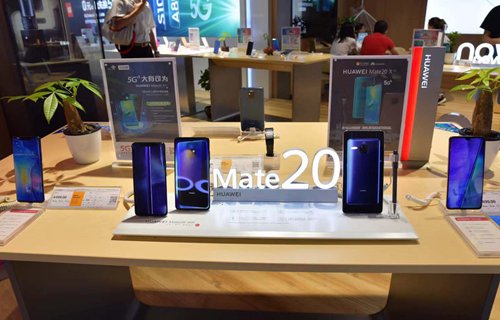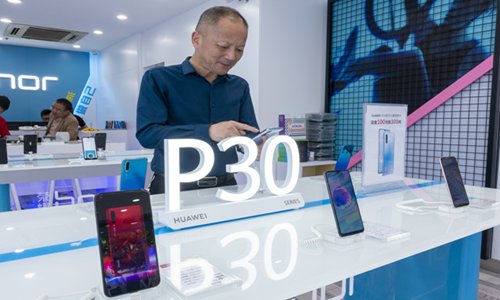HOME >> BUSINESS
China's stance on trade talks won't change whether Washington gives Huawei another 90-day reprieve or not
By Wang Cong Source:Global Times Published: 2019/8/18 19:28:39 Last Updated: 2019/8/19 11:14:40
Huawei to keep moving, Beijing to maintain ground: analysts

Huawei's first 5G device the Mate 20X is displayed in Shanghai on Friday. Photo: IC
A decision by the US government on extending a reprieve to Chinese telecom company Huawei Technologies is unlikely to change China's stance in the trade negotiations with the US, which have been proceeding very slowly, analysts said on Sunday.
Though a decision to move forward with the export ban on Huawei could inflict short-term pain on the Chinese company, particularly its global smartphone business, the company has moved swiftly in recent weeks to prepare for long-term operations -- and analysts said that the US decision will not change that.
As the 90-day reprieve announced in May is set to expire on Monday, the US Commerce Department is expected to make a decision on whether to grant Huawei another extension to allow US companies to continue supplying Huawei.
Citing national security concerns, the US placed Huawei on what's known as an "Entity List" - essentially barring US companies from exporting components and software to the company. But Chinese officials and Huawei executives call the move politically motivated to contain the rise of China in the upcoming era of ultrafast 5G networks.
It is widely believed that the Trump administration is using the Huawei ban as a bargaining chip in the broader trade talks. In May, after a high-profile meeting between the leaders of the two powers that restarted stalled trade talks, the White House announced a "temporary general license" for US companies to continue to supply Huawei.
Citing sources familiar with the matter, Reuters reported on Saturday that the US will extend the temporary license for another 90 days. However, the sources also noted that the situation remains fluid and the decision to extend the reprieve could change.

A customer experiences Huawei’s smartphones in Shanghai in May. Photo: VCG
No change in China
But that will not change anything from the Chinese perspective. Officials will continue to hold their ground in the trade talks and Huawei is moving forward with its contingency plans long in the making, analysts noted.
"No matter what the US decides, there is one thing that has not changed: The US has not changed its maximum pressure tactics a bit, even after a year," Li Yong, deputy chair of the expert committee at the China Association of International Trade, told the Global Times on Sunday. "So it is only appropriate that the Chinese side also firmly holds its ground."
In a clear sign of the US' persistent maximum pressure tactic, the Washington announced that it would impose a 10 percent tariff on more than $300 billion worth of Chinese goods starting on September 1.
Though the US later announced that it would delay the tariff on certain household goods until December 1 to ease the impact on US families ahead of the Christmas shopping season, China firmly responded, saying that if the US went ahead with the tariffs, it would take "necessary countermeasures."
For Huawei, any decision by the US is unlikely to change its recent push to be self-reliant in core components, including smartphone chips and an operating system (OS), said Jiang Junmu, the chief writer at telecom industry news website c114.com.cn. Huawei recently released its Harmony OS.
"The impact [of the ban] will be mostly overseas. In China, Huawei's sales will continue to grow," Jiang told the Global Times. He noted that another reprieve means that the US will continue to demand that China give further ground, so Huawei "is better off to not have any illusions" about the US letting it off.
Huawei did not offer a statement to the Global Times as of press time on Sunday. But in an interview with Sky News on Friday, Huawei founder and CEO Ren Zhengfei sounded upbeat about his company, though he admitted the ban could affect its smartphone sales.
"If the US government does not allow Google to provide the Android operating system, then the world may have a third operating system…You cannot rule out the chance that the third operating system might outrun them someday," Ren said.
Newspaper headline: Trade talks stance won’t change
Posted in: COMPANIES